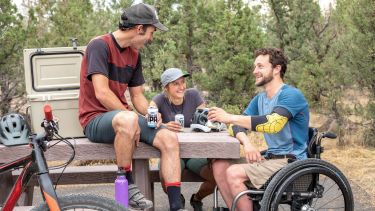Disability and disadvantage cohort 2018-19
The 2018/19 cohort of Crook Public Service Fellows are working on the theme of 'Disability and Disadvantage'

Cohort members
Louise Wilkinson
Louise Wilkinson is Head of Information and Learning for the Child Brain Injury Trust, a national charity that supports those affected by childhood acquired brain injury (ABI). Louise has been at the charity for over 10 years and during this time has personally delivered ABI training to over 6,000 professionals across many sectors, but predominantly education.
Over the last five years Louise has been instrumental in highlighting the issues of childhood acquired brain injury (ABI) and the links with offending behaviours, and the importance of support within education for this cohort, to avoid young people being excluded and entering the justice system. She is founder member of the Criminal Justice and Acquired Brain Injury Interest Group (CJABIIG), and won the UKABIF Stephen MacAleese Award for Inspiration by an Individual in the field of ABI, for her work in this area. Read Louise's report.
Currently Louise is involved with the All Party Parliamentary Group on Acquired Brain Injury, and raising awareness at the highest levels for improved support within education for children following childhood ABI.
Dealt a Blow: Exploring the relationship between traumatic brain injury and school exclusion
Whilst there is a strong body of evidence to suggest that Traumatic Brain Injury (TBI) is highly prevalent among those in prisons, and that educational disengagement plays an influential role in this trajectory, to date there has been no research into the experiences of TBI among those excluded from school.
The aim of this study was to understand the needs and difficulties of a group of young people who report a TBI, and who, having been permanently excluded from school, were subject to alternative educational provision, and, in doing so, to understand the potential for improved support.
Read the briefing (PDF, 3.2mb)
Liam Toner
Liam Toner is a social work team manager for Sheffield City Council and has worked in social care all his adult life. His hope is that he’s an ally to disabled citizens, working alongside them to challenge the barriers they face to living the full and active lives they are entitled to.
Alongside work, he is a Fellow of the Centre for Welfare Reform, a think tank aiming to improve the welfare system and has a research Masters which focused on critical disability studies and participatory approaches to research. He was also on the board of SUFA, a Sheffield based user-led advocacy organisation.
Liam asserts that social care has faced and continues to face serious challenges which directly affect the lives of disabled people. Through this fellowship Liam wants to explore how citizens, social care professionals and others could work better together, taking full advantage of the strengths and resources each brings, to meet some of these challenges. He is keen to draw on learning from the co-operative movement’s alternative organisational models, which might help in rethinking the divide between citizens and the welfare state.
The Power of Small Gestures: Emotions and Relationships in Social Worker Practice
Social work is a human profession. It is concerned with people, their lives and their communities. As a result, social work is fundamentally a profession based around relationships, whether that is between a practitioner and a person, a local authority and a community or the state and its citizens.
We are interested in whether, by drawing attention to this and exploring how this is done, we might be able to redress the balance; to re-humanise social work and propose a complementary definition of what it means to be a social work professional, rooted in a conversation between social workers and disabled people.
Read the briefing (PDF, 791kb)
Lucy Virgo and Sunderland People First: Joint Fellowship project
Inclusion North and Sunderland People First
Lucy Virgo has worked with people with a learning disability and their families for twenty years at a local, regional and national level. She works as a Project Support Co-ordinator at Inclusion North. She is currently working on a number of projects including a leadership course for young people with a learning disability, autism or both, and a families listening project.
Sunderland People First is a user-led Community Interest Company. They work with people with a learning disability and or autism and their families to improve their status as full independent and contributing citizens of their community.
Based in the North East of England, they have over 20 years of experience of working with service’s such as Sunderland City Council, Sunderland CCG, NHS England, Northumbria police and other voluntary sector organisations to drive forward positive change.
They achieve this through consultation, co-production, promoting national and local campaigns, giving people a collective voice and are recognised both locally and nationally for their award-winning work.
For the Fellowship Sunderland People First will be represented by two service users who will work closely with Lucy on a project looking at issues around self advocacy.
Self-Advocacy on the Map: Mapping and Promoting the Self-Advocacy of People with Learning Disabilities and/or Autism
Nearly 10 years of austerity (cuts) have seriously threatened the services and support for people with learning disabilities and/or autism. One area of great strength remains: self-advocacy. While threatened by cuts in funding, self-advocacy groups in the UK continue to support people with a learning disability and or autism and their families to improve their status as full independent and contributing citizens of their community.
Our project sought to promote self-advocacy and its importance nationally. We also aimed to identify, capture and document the work of self-advocacy groups across the country through the development of an online map.

Experience Sheffield for yourself
The best way to find out what studying at Sheffield is like is to visit us. You'll get a feel for the atmosphere, the people, the campus and the city.
